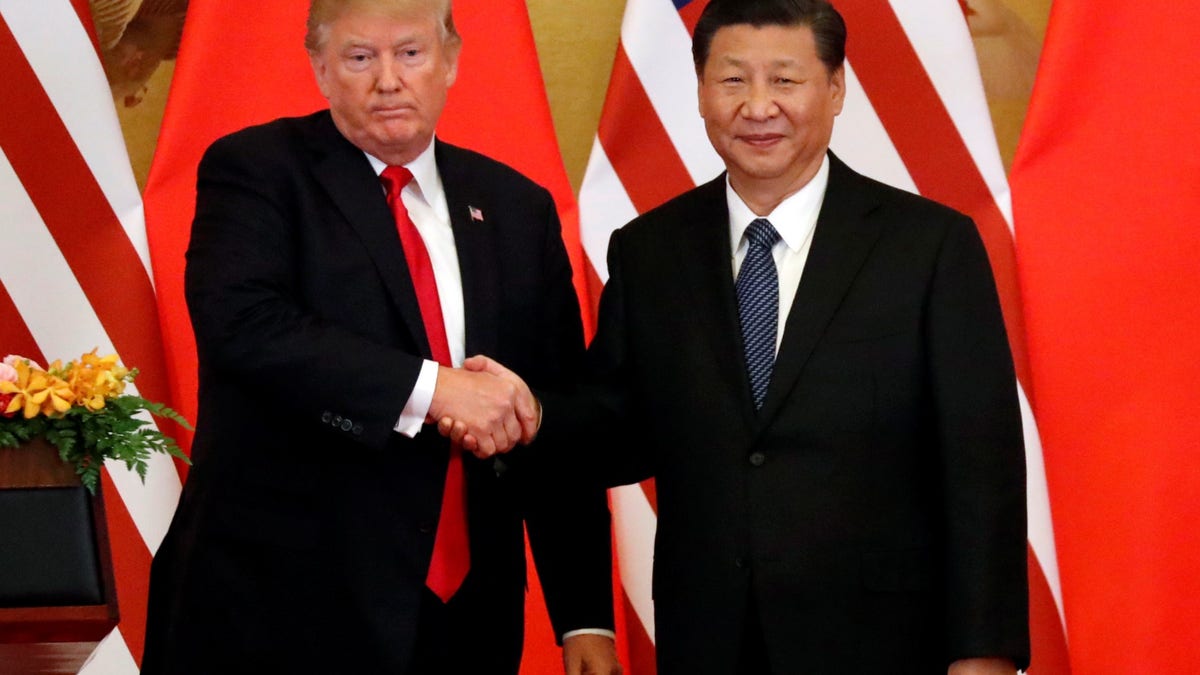
FILE -- President Donald Trump and China's President Xi Jinping make joint statements at the Great Hall of the People in Beijing, China, November 9, 2017. (REUTERS/Jonathan Ernst)
I recently had dinner in Beijing with a close friend. We chatted about work, travels and kids. Like me, she is a professor and a mom. Unlike me, she is a member of the Chinese Communist Party.
I thought of my friend recently when President Trump described China during his State of the Union address as a rival that challenges “our interests, our economy and our values.”
The economic, security and geopolitical challenges of a rising China are certainly serious and should be met with a strong response. At the same time, concerns are stirring about a broader anti-Chinese backlash in the U.S. Earlier this month, my fellow Fulbright Scholarship recipient Wang Xiaofeng warned of this in an op-ed in Caixin Global News (a Chinese website).
The op-ed was headlined: “Understanding America’s China-Phobia.” Wang wrote: “Why is China’s business activity in the U.S. often linked to ‘national security risks,’ with typical China-phobic rhetoric? Why does the panic towards Chinese economic influence still prevail in the U.S., even as the two countries’ economies become increasingly interconnected?”
Concern that protecting national interests can tip towards xenophobia is not limited to U.S. relations with China. The post-World War II anti-Communist Red Scare and the Trump administration’s travel bans targeting some Muslim-majority countries underscore this point.
Nor is anti-Chinese sentiment in the United States new, as epitomized by the Chinese Exclusion Act of 1882, which barred Chinese laborers from immigrating to the United States.
What is cause for concern today is that we have entered a period when disagreements between the governments of China and the United States threaten to breed hostility between their citizens.
The Chinese government – meaning the Chinese Communist Party, which has a monopoly on power – is increasingly assertive abroad and repressive at home. I am a vocal critic of its rampant human rights violations.
However, I also believe that we need to distinguish the Chinese government from the approximately 1.4 billion Chinese citizens. During my time living abroad, I have appreciated when people treat me as an individual. I am American, but I am not America.
Likewise, using “China” is a convenient shorthand, but it lumps together the many viewpoints of people who hold Chinese citizenship. At this moment of escalating tensions, individual Americans and Chinese need to forge relationships rather than resign ourselves to existing as rivals.
Despite threats to slash the budget for the flagship Fulbright Program, the Trump administration recognized the importance of people-to-people ties at the inaugural U.S.-China Social and Cultural Dialogue held in September, stating that “exchanges between the United States and China … have been effective at building understanding, breaking down barriers to a more constructive relationship, and connecting our peoples.”
As Sen. J. William Fulbright explained of the program bearing his name, it aims “to bring a little more knowledge, a little more reason, and a little more compassion into world affairs and thereby to increase the chance that nations will learn at last to live in peace and friendship.”
People-to-people ties are not a panacea for the tensions between the United States and China. President Trump and Chinese President Xi Jinping will not end up holding hands and singing “Kumbaya” around the proverbial campfire because of increased interactions among their countries’ citizens.
Interpersonal contacts can, however, cultivate a more nuanced understanding of the various facets of the bilateral relationship. They can also encourage an appreciation for why individual Chinese citizens support or oppose the current leadership, and why many are hesitant to express political opinions outside of intimate conversations.
I do not necessarily agree with the decisions that my friend in the Chinese Communist Party has made, but I understand why she has made them.
Pushing past a simplistic China-as-rival mentality does not require befriending a member of the nation’s Communist Party. Start today by picking up one of these books or checking out the many excellent online resources such as SupChina, Women and Gender in China (WAGIC), ChinaFile, and Sixth Tone.
Then reach out to learn about China, in person, from people from China. Invite one of the hundreds of thousands of Chinese students studying in the United States to lunch. Attend an event with a speaker from China hosted by a local world affairs council or university.
If your resources allow, visit China with an inquisitive attitude that takes you beyond the normal off-and-on bus visits to tourist sites. The more numerous and varied the contacts between American and Chinese citizens, the better the chance of breaking down a monolithic us-versus-them mentality and tackling disagreements in an informed, thoughtful and dignified manner.
The health of the long-term U.S.-China relationship depends on the strength of interpersonal bonds. I started studying Chinese in the fall of 1989. It was an unusual choice, especially in the wake of the massacre of demonstrators in Tiananmen Square and other areas of Beijing.
My choice was less surprising when viewed from the perspective that an exchange teacher from Shanghai had lived with my family. At the dinner table, I gained a glimpse into the complexities of life in China through her gradual revealing of personal struggles as an intellectual during the tumultuous decades after the beginning of Communist rule in China.
Three decades later, we need people from the United States and China sitting down for dinner together now more than ever.








































